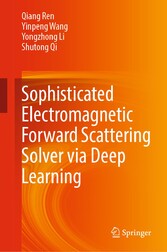Sophisticated Electromagnetic Forward Scattering Solver via Deep Learning
von: Qiang Ren, Yinpeng Wang, Yongzhong Li, Shutong Qi
Springer-Verlag, 2021
ISBN: 9789811662614
, 125 Seiten
Format: PDF
Kopierschutz: Wasserzeichen
Preis: 117,69 EUR
eBook anfordern 
Mehr zum Inhalt

Sophisticated Electromagnetic Forward Scattering Solver via Deep Learning
This book investigates in detail the deep learning (DL) techniques in electromagnetic (EM) near-field scattering problems, assessing its potential to replace traditional numerical solvers in real-time forecast scenarios. Studies on EM scattering problems have attracted researchers in various fields, such as antenna design, geophysical exploration and remote sensing. Pursuing a holistic perspective, the book introduces the whole workflow in utilizing the DL framework to solve the scattering problems. To achieve precise approximation, medium-scale data sets are sufficient in training the proposed model. As a result, the fully trained framework can realize three orders of magnitude faster than the conventional FDFD solver. It is worth noting that the 2D and 3D scatterers in the scheme can be either lossless medium or metal, allowing the model to be more applicable. This book is intended for graduate students who are interested in deep learning with computational electromagnetics, professional practitioners working on EM scattering, or other corresponding researchers.
Qiang Ren received the B.S. and M.S. degrees both in electrical engineering from Beihang University, Beijing, China, and Institute of Acoustics, Chinese Academy of Sciences, Beijing, China in 2008 and 2011, respectively, and the PhD degree in Electrical Engineering from Duke University, Durham, NC, in 2015. From 2016 to 2017, he was a postdoctoral researcher with the Computational Electromagnetics and Antennas Research Laboratory (CEARL) of the Pennsylvania State University, University Park, PA. In Sept 2017, he joined the School of Electronics and Information Engineering, Beihang University, Beijing, China, as an 'Excellent Hundred' Associate Professor.
Dr. Ren is the recipient of the Young Scientist Award of 2018 International Applied Computational Electromagnetics Society (ACES) Symposium in China. He serves as the Associate Editor of ACES Journal and Microwave and Optical Technology Letters (MOTL), and also serves as a reviewer for more than 30 journals. His current research interests include numerical modeling methods for complex media, multiscale and multiphysics problems, inverse scattering, deep learning and parallel computing. He has published more than 70 papers on the journals and conferences.
Yinpeng Wang received the B.S. degree in Electronic and Information Engineering from Beihang University in 2020, where he is currently pursuing his M.S. degree in Electronic Science and Technology. From 2017 to 2018, he was a researcher at the Physical Experiment Center, Beihang University. In 2018, he worked as a research assistant in the Spintronics Interdisciplinary Center. Since 2018, he has been a member of the Institute of EMC Technology.
Mr. Wang focuses on the research of electromagnetic scattering, inverse scattering, heat transfer, computational multi-physical fields, and deep learning. Since 2018, Mr. Wang has published 8 peer-reviewed technical papers in international journals and conferences. He serves as a reviewer for Springer, IOP and IEEE journals. He was a recipient of the Outstanding Freshmen Scholarship and the First Prize of the Academic Scholarship.
Yongzhong Li received the B.S. degree in Electronic and Information Engineering from Beihang University in 2020. He is now pursing the MASc degree in Electrical and Computer Engineering, University of Toronto. From 2018 to 2020, he has been a research assistant of the Institute of EMC Technology. From 2020 to 2021, he worked as a research assistant in the Physics department at the Hong Kong University of Science and Technology. Now he is a graduate student at University of Toronto.
Mr. Li focus on the research of numerical modeling for multiphysics and multiscale problem, machine learning and wave functional material. Since 2018, Mr. Li has published 6 peer-reviewed technical papers in international journals and conferences. He serves as a Reviewer for IOP journals. He was a recipient of the Outstanding Graduate in 2020.
Shutong Qi received the B.S. degree in Electronic and Information Engineering from Beihang University in 2020. He is pursing the Ph.D. degree in Electrical and Computer Engineering, University of Toronto. From 2018 to 2020, he has been a research assistant of the Institute of EMC Technology. Now he is a graduate student of University of Toronto.
Mr. Qi focus on the research of finite-difference method, electromagnetic scattering, deep learning and human-computer interaction. Since 2018, Mr. Qi has published 7 peer-reviewed technical papers in international journals and conferences. He was a recipient of the Outstanding Graduate in 2020.











